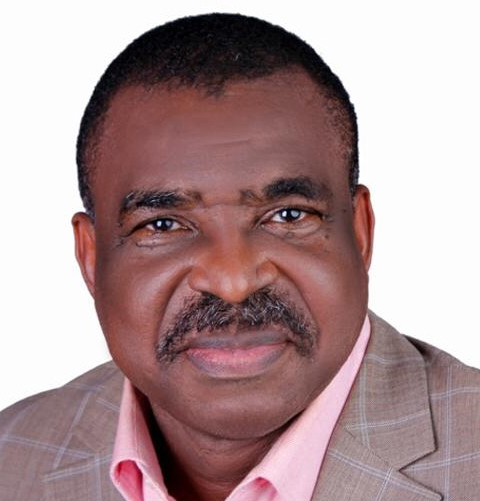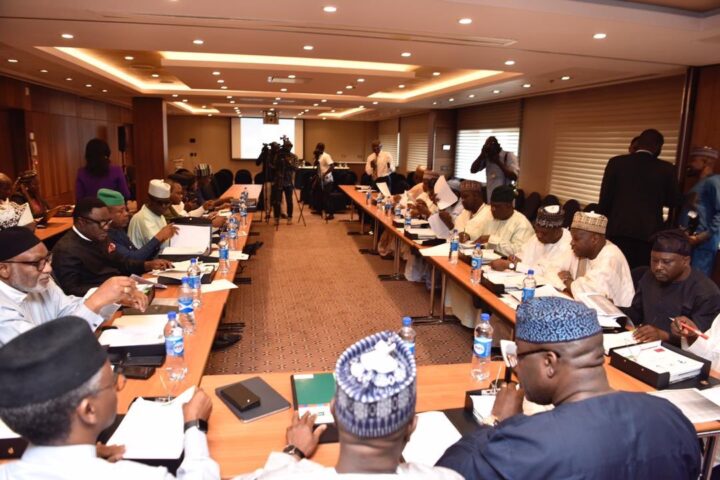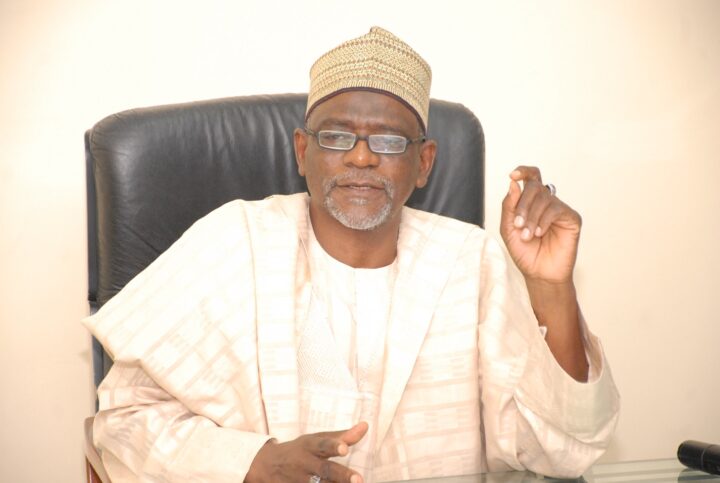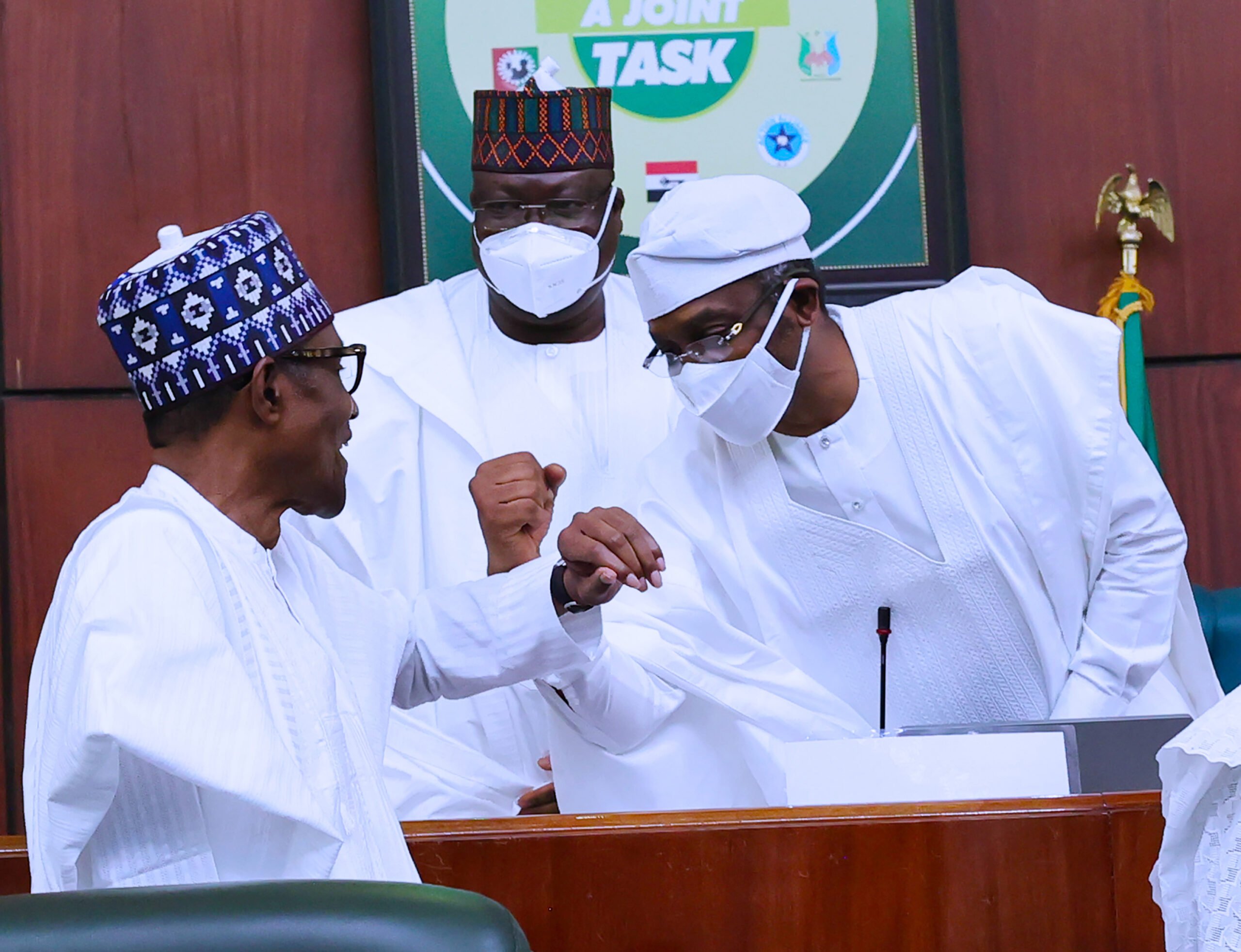Hakeem Baba Ahmed, the petulant spokesman of the Northern Elders Forum, NEF, literally threw gasoline into the fire already ignited by the southern governors Enugu declaration that the presidency must return to the south in 2023 based on the gentleman’s agreement entered into between northern and southern politicians during 1994/5 national conference.
It is not surprising that an incendiary statement that he made at an event held in Zaria, Kaduna State would literarily set the already combustible political atmosphere alight.
Hear him:
“We will lead Nigeria the way we have led Nigeria before, whether we are President or Vice President, we will lead Nigeria. We have the majority of the votes and the democracy says vote whom you want.”
Advertisement
Baba-Ahmed was actually reacting to the demand by the southern states governors that the pendulum of the presidency of Nigeria must swing to the south in 2023 in consonance with the agreement which had been in operation since the return of multi-party democracy in 1999.
Due to the fact that the political space was already charged with negative energy and the embers of hate were still flying between northerners and southerners, his speech was misinterpreted as the following critical component of it was ignored:
“… we will lead Nigeria whether we are president or Vice President…”
Advertisement
An unbiased reading of the statement does not imply that Baba Ahmed was suggesting that northerners are born to rule as some commentators have concluded. With emphasis on the phrase “…or Vice President”, it is clear that he admitted that the north may produce the Vice President as was the case with Namadi Sambo who was Vice President to Goodluck Jonathan (2010-2015)
But given the present toxicity of the political atmosphere, the un-curated comment by Baba-Ahmed heated up the polity. And it did not help when the northern governors in concert with their traditional rulers met and released the following statement in a communique which seemed to have endorsed Baba-Ahmed’s unguarded utterance and hell was literarily let loose.
The communique reads thus: “Some Northern States Governors had earlier expressed views for a power-shift to the three geo-political zones in the South with a view to promoting unity and peace in the nation.”
The statement read by Plateaus state governor, Simon Lalong on behalf of his colleagues rejected the demand of the southern governors with the following assertion:
Advertisement
“Notwithstanding their comments, the forum unanimously condemns the statement by the Southern Governors Forum that the Presidency must go to the South.
“The statement is quite contradictory with the provision of the Constitution of the Federal Republic of Nigeria (1999) as amended that the elected President shall: score the majority votes; score at least 25 per cent of the votes cast in 2/3 states of the federation. In the case of run-up, simple majority wins the election.”
Again, reading the statement without prejudice, it would be apparent that the northern governors are not against power shift per se. But their gripe is with the autocratic word “must” which is deemed to be undemocratic. Either the word “must” was unwittingly employed by the southern governors in their communique or the northern governors were nitpicking or politicking by latching onto such a democracy technicality to engage in filibustering.
Whatever the case may be, it is relieving to know that there is really no conspiracy from the northerners against presidential power shift from their zone to the south in 2023.
Advertisement
An aspect of the development on which most commentators have not expressed any opinion is that while the south has continued to speak as governors, the north has been speaking as governors and elders. That is because they have been carrying their traditional rulers along by holding joint meetings with them. And that is always reflected in their communique?
Does this suggest that the northern governors accord their traditional rulers and elders more respect and recognition than their southern counterparts who appear to be solo in their deliberations and negotiations? Another unique pattern that l have noticed is that all the northern governors seem to be in sync with their common objective and purpose. This is evidenced by the fact that they are all often fully represented at the meetings organized by the forum. Contrarily, Southern governors’ meetings have not had in attendance the full complement of governors. Cross Rivers and Anambra states governors who have absented themselves the most, are the main culprits. And they appear to be rebellious and therefore represent a weak link in the group which is quite appalling as the aforementioned duo pose an existential threat to the unity of southern governors.
Advertisement
By and large, by issuing a communique alleging that the southern governors were undemocratic in their approach, the northern governors can be said to be equally guilty of the offense that they had earlier berated their southern counterparts for committing. Applying the same standard that they have set, the ideal thing for the northern governors and elders to have done would have been to quietly engage with their southern counterparts with a view to pointing out that they were out of order by toeing the autocratic path in using the offending word “must” in their communique.
Instead, they went public and literarily threw the book, and if you like, kitchen sinks at the southern governors by reprimanding them openly.
Advertisement
In any case, the impasse is a classical manifestation of the dictum, ‘two wrongs can not make a right’
Meanwhile, the decisions made by both sides to engage in a public war of words fit into the playbook of politicians. Typically, they like to raise the stakes via dramas and melodramas. Since it is a critical part of politicking, it is no surprise to most political aficionados.
Advertisement
In a widely publicized opinion piece entitled: “How To Become The President Of Nigeria, 2023”, where l dwelt on the face-off between the politicians on both sides of the divide about a presidential power shift, l had predicted an amicable resolution. Here is how l had put it.“Ordinarily, the Southern governors could be said to be re-affirming an existing agreement. But their northern counterparts do not see it as such. Instead, they deem the decision of the southern governors as an imposition. Apparently, the northern governors are affronted by the fact that what should have been negotiated was turned into a grandstanding affair. Hopefully, after the initial filibustering which is a major part of politics, both the southern governors who needed to show their constituents that they are not Lily-livered, but possess some spunk and the northern governors who may be intent on getting something in return for the likely impending concession of the presidency to the south in 2023, which is typical of politicians who often get a kick from horse-trading, would settle their differences.”
A typical example of the ongoing political brick brats in Nigeria is the contest of political interests that are currently playing out between the progressives in the US House of Representatives and moderates in the senate. Although they are both members of the ruling Democratic Party under President Joe Biden, the passage of the party’s strategic development proposal has been held up or suspended in congress a couple of times because the lawmakers in both the progressive and moderate camps are yet to find common grounds or balance in their group interests.
For instance, following the grandstanding by the caucuses led by the likes of senator Joe Manchin of Virginia and Representative Pramila Jayapal -of Washington, the infrastructure bill which is a defining policy of Biden’s regime, already passed in the senate is currently suspended.
But it would eventually be passed by the House of Representatives after being put through the crucible via the fiery resistance by the progressives who want their interests in the jobs support and social services proposal, accommodated.
The political wrangling which has so far resulted in stalemating the passage of $1.5 trillion and $3.5 trillion bills that would positively impact the lives of millions of Americans may be equated to passing raw gold through the furnace prior to its becoming a refined gem. The situation is not different in the United Kingdom where prime minister, Boris Johnson is facing internal resistance within his party. The rebellion stems from the fear of higher tax arising from the proposed reform that involves the injection of funds into the UK health system, NHS. As expected, the echoes of the impending tax burden are threatening to overshadow events in Manchester where the Tories are holding their annual conference.
And typical of political actors, 50 members of parliament from his party broke ranks with Boris Johnson.
But after all was said and done, the politicians would iron out their differences and leave the conference with the leadership of the Conservative Party being on the same page.
As to be expected, the opposition Labor Party had in the previous week in a similar conference held in Brighton accused the ruling party of wrecking the lives of Britons with Brexit and it is now saddling the working class with huge burden tax which they intend to revolt against.
Their stance is a counterpoise to the Tories proposed £500b jobs support fund and funding for the NHS reform which would be extracted as tax from the workers.
Given the above narrative of how multi-party presidential and parliamentary systems of government are playing out in both the USA and the Uk, the situation in our country, which acquired its former parliamentary and present presidential systems of government from those two countries, can not be an exception. Hence, the face-off between northern and southern politicians can not just be ephemeral as evidenced by the cases in the USA and UK where after engaging in intensive dialogues, the countries always move forward stronger and better.
That simply implies that political squabbles often lead to significant positive changes in the policies of the government and by extension impart society in salutary ways.
Bearing that in mind, l regard the clash between the northern and southern governors in Nigeria as putting the gentleman agreement on a rotation of presidential power through a furnace. The contest of wits would also facilitate the fine-tuning of the controversial Value Added Tax, VAT now on the front burner of political discus even as it should compel the devolution of power to the states via the movement of some functions currently captured in the Exclusive to the Concurrent list.
If those propositions can come into reality, they would make states more nimble and the federal government not as powerful as it is currently, which is also known as restructuring.
It is expected that after the envisaged intensive politicking which would hopefully whittle the power of government in the centre and strengthen the capacity of the states, it may be easier to determine whether the rotation of presidential power between the former northern and southern protectorates of the British empire that merged in 1914 should be sustained beyond 2023.
My guess is that at the end of the anticipated joint deliberations which should be vigorous and no holds barred, and the presidency of Nigeria becomes not as powerful and therefore equally unattractive to deserve the current ethnoreligious energy and financial resources invested in acquiring it, our country would be a better nation.
Afterward, there would be no more reasons for the current north-south divide to fester, as it would be replaced with the political zeal for mutually beneficial cooperation.
That is assuming for the sake of morality, it is accepted that the third member of the Nigerian triumvirate that is yet to benefit from the presidential zoning arrangement-the lgbos would be given the opportunity to take their turn in calling the shots in Aso Rock Villa, so that as they say in local parlance, the equation may be balanced before discontinuing the practice.
While not denying that the informal presidential power-sharing arrangement has played a critical role in sustaining Nigeria’s unity since 1999, l am of the conviction that, it is probably responsible for the zero-sum politics that is currently hobbling the efforts of successive administrations to build up infrastructure that would engender prosperity and deepen democracy in our beloved country.
It is astonishing how events in the past 6 years have proven that the presidential zoning arrangement which had been deemed to be an efficacious political balancing mechanism between northern and southern ethnic nationalities can be susceptible to abuse. Arising from that reality, there is an urgent need for a robust and sustainable solution to the issues that threw up the zoning of presidential power between the north and south which is the mutual suspicion about the dominance of a group over the others. The criticality of the matter of fixing the broken political system is such that politicians can not afford to continue to doodle over that assignment by literarily ‘ kicking the can down the road ’ as Americans like to term it.
For instance, owing to the negative impact on progress and prosperity that zero-sum politics has foisted on the politics of our country since 1999, we urgently need to eliminate the tendency for successive ethnic nationalities who take over Aso Rock Villa to be obsessed with the agenda of bringing down the castle built by their predecessors and replacing same with a monument structured on their own kit and kin.
That is clearly the reason, that every 8 years when the presidential pendulum swings from the north to south or vice versa, our country goes back to ground zero in terms of socio-economic development.
In replacement, we can adopt a multi-sum political arrangement that is equity-based, all-inclusive, and merit-driven that would encourage the next president to build on the structure erected by his predecessor for the advancement of progress and prosperity of all Nigerians irrespective of ethnicity or religion. That would be a positive antithesis to retrogression which the zero-sum system currently in practice, has wrought on our beloved nation.
And l would argue that zero-sum politics is, for instance, one of the key reasons that countries like Indonesia which was at par with Nigeria at independence in 1960 can boast of GDP of $1.1 trillion while Nigeria is posting less than $440 billion, which is less than half of Indonesia’s that should be her peer.
But whether the northern and southern political actors currently butting their heads would see the contest of wits as a refining process for public policies and programs for the greater good of all, as opposed to the fight to finish between the north and south, as Baba-Ahmed characterized it in his address to the youths in Kaduna, is another kettle of fish.
Experience, which sages recommend as the best teacher, has taught us that violence and deployment of force as a solution to social issues, rarely usher peace into any society. If at all, it only engenders hollow and temporary reprieve.
And that amounts to postponing the evil day.
Our founding fathers were aware of the benefits of dialogue, hence back in the days of the practice of the parliamentary system of government,1960/6, it was not uncommon for the leaders of the regions to grandstand. But the points of disagreement were never allowed to fester and degenerate into intractable conflict or crisis in the manner that such are bedeviling our country.
Based on historical records, at a point in our checkered history, the leader of the eastern region, Sir Micheal Okpara wanted secession as a clause embedded in the constitution. But the northern and western leaders, Sir Ahmadu Bello and Chief Obafemi Awolowo respectively rejected it. Subsequently, in an ironic twist, both the northern and western leaders that had earlier dissented later demanded the inclusion of a referendum proviso in Nigeria’s statute book. The table was turned literarily as, Okpara, the eastern region premier opposed it.
Today, the Igbos that are pressing for referendum via Indigenous People of Biafra, IPOB, are proscribed by the authorities from doing so ostensibly because there is no constitutional backing for separatism and the current Aso Rock Villa occupants have zero tolerance for such agitations.
The beauty of governance under the parliamentary system which the British practice and bequeathed to Nigeria upon independence is that whenever any party to the union was uncomfortable with any rule or condition guiding the partnership, the concerns were ironed out during conferences that were held in Ibadan, Enugu, and Kaduna.
So in the good old days, the unity of Nigeria was negotiated by the leaders of the east, north, and west, later mid-west and our country did not break up. That is in stark contrast with the current dispensation whereby the mantra: the unity of Nigeria is not negotiable, is oft-touted by the powers that be in Aso Rock Villa. The simple rule of the thump about partnerships and marriages is that if they can not be negotiated, they would ultimately be broken.
The unfortunate civil war of 1967-70 with its horrific consequences ingrained in our memories is likely the driver for the mindset of Aso Rock Villa that the unity of Nigeria is not negotiable.
But as genuine as the desire to keep Nigeria as one indivisible entity is, it appears to me that the ineffectual and ineffective proclamation by the leaders in Aso Rock Villa that Nigeria’s unity is not negotiable may be doing more harm than good to “The labors of our heroes past…” which may end up being in vain if peradventure our country unhinges. That would be a negation of a critical stanza in Nigeria’s national anthem:”The labors of our heroes past shall not be in vain.”
It is incontestable that the alarming rate at which separatist movements are popping up around the country is the underlying reason that Nigeria’s unity should be negotiated, so that the grievances of members of the union may be addressed for peace to reign.
Not rescinding the policy which is unsustainable is an avoidable folly on the part of the federal government which is apparently yet to come to the realization that its stiff neck attitude against negotiating the unity of Nigeria that is responsible for the rising spate of vicious agitations for secession from the east, now being joined by the west and middle belt regions of our beloved country.
If the atmosphere of fairness, equality, and justice are prevalent, l don’t know any ethnic nationality that would not want to remain part of Nigeria?
Under the presidential system operationalized by the military via the 1979 constitution, national conferences to iron out differences between the multiple ethnic nationalities for harmonious co-existence before matters degenerate into serious crisis are no longer regularly held. That is signposted by the fact that in a period of over 21 years since the return of multi-party democracy in our country, it is only 2014/15, national conferences have been held.
Before then, the military government led by Sani Abacha had organized a sovereign national conference in 1994/5.
Matters are even made worse by the fact that the recommendations on how to make the country better after the intensive conferences between the multiple nationalities are never implemented.
A comparison between the current situation of little or no national dialogue to the period of the practice of the parliamentary system of government when inter-regional dialogues were regularly held by the leaders of the regions in Ibadan, Enugu, and Kaduna would reveal why there was consistent peace and unity in our country pre 1966 military coup detat and the present situation whereby our country is tottering on the brinks of collapse as a result of avoidable conflicts.
Today, rather than regular conferences between and amongst the 36 federating units or states, the toxic contents of communique emanating from the 19 northern and 17 southern states governors meetings, has squeezed out all the oxygen of national unity.
It is trite to state that it is such exclusive regional meetings, which symbolize separatism, that significantly constitute the factors doing grave damage to the fabric of unity of our dear country.
Whereas it was evident to democracy enthusiasts like us that there are risks inherent in the unwholesome gatherings by governors from the north, which often amplify the pre-amalgamation divisions, it was not apparent to the purveyors of the practice that it was adversarial until their southern counterparts copied the practice as a counterpoise.
One of the obvious negative fallouts is the current stalemate arising from both sides issuing each other, ultimatums and rebukes.
Beyond what is in open view, are other incipient damages done since 1999 to the chord of unity before what seems like the proverbial straw that broke the camel’s back currently on display.
Of course, there is nothing inherently wrong with the concept of ethnic groups or regions meeting to marshal out what is of strategic interest to them. What is harmful is a situation where the sub-national groups fail to subsequently hold meetings with each other to find common grounds on identified issues of national interest.
The evolution of such inter-regional meetings between southern and northern governors as well as traditional rulers is part of the underlying reason for my optimistic projection that there would soon be a sheathing of swords and engagement in negotiations by the feuding politicians.
It is fortuitous that a process of resolution of the impasse has already kicked in with Nasir El-Rufai, the governor of Kaduna state and the host of the last NEF meeting offering clarification about the position of the north.
The Kaduna state governor pointed out that the content of the communique had been misrepresented, and thus misunderstood by the majority of Nigerians who felt the offending statement is hypocritical.
And El-Rufai took it upon himself to remind the aggrieved that power shift is actually enshrined in the All Progressives Congress (APC) and the Peoples Democratic Party (PDP) constitutions.
He further re-assured southerners that the APC committee set up and charged with chatting the way forward for the party after the 2019 victory at the polls which he led had recommended power shift to the south in the interest of peace and harmony.
What can be more?
The positive attitude of the host government of the NEF meeting that is now on the path of rapprochement has been consolidated by a rather conciliatory statement by the hitherto combative NEF spokesman, Hakeem Baba-Ahmed who admitted that “What is left is for the Northern governors to engage with their Southern colleagues on the way forward,”
In light of the above, l think our dear country is about to see the back of the intractable political crisis which had reared its ugly head via the unhelpful communique issued by both the southern and northern governors.
And how the politicians on both sides decide to resolve their political differences in the coming days, weeks and months, would be remarkable. But the resolution of already identified contentious issues regarding presidential power-sharing, VAT collection, and open grazing should not remain unresolved beyond the occasion of the national conventions of the ruling and main opposition parties respectively.
They should do whatever it may take to ensure that the stalemate does not persist beyond the current breaking point. Rather, the demagogues are enjoined to step up their horse-trading in order to build better relationships that would create bridges between the north and south, and ultimately deliver lasting and quality solutions to the intractable challenge of balancing presidential power amongst other existential matters of contention in our beloved country.
Without a scintilla of doubt, rubbing of minds would help our country avoid future problems and conflicts with respect to the dodgy issue of presidential power-sharing arrangement between the north and south by addressing what appears to be the demon of president Buhari’s administration, frontally once and for all.
At the end of the current face-off between the north and south, I’m optimistic that there would be concrete plans to do away with the contentious presidential rotation formula which is supposed to be a temporary solution to an identified challenge. And in order for meritocracy to replace rotation of the presidency, genuine efforts should be made by president Buhari for the ideal leadership system that we all agree would result in optimum benefits for all ethnic nationalities, which is to devolve power from the center to the states, to take its pride of place.
As a starter, both the northern and southern politicians should set up task forces to net off their differences and harsh out an acceptable Standard Operating Procedure, SOP to address future conflicts which are bound to crop up in the future. It should be a standing committee just like the United Nations, UN or Africa Union, AU, dispute resolution committees. The Presidential Task, PTF that was established to tackled the COVID-19 pandemic and led by Boss Mustafa, Secretary to the Federation government is also a good local example. And the commendable efforts of the committee in successfully curbing the spread of the deadly disease can be replicated with respect to the management of insecurity arising from religious insurgency and separatist movements by our disaffected compatriots.
The presidential Power rotation and VAT controversies are good candidates for negotiation by such a committee that would always seek common grounds for amicable solutions as opposed to applying brute force to resolve conflicts.
And Aso Rock Villa should also do well to establish a constitution compliance monitoring desk to serve as a mechanism for nipping aggravations that could trigger separatist tendencies in the bud.
There is nothing that can not be negotiated.
Therefore, in the interest of peace, we can commence the process of bringing IPOB led by Nnamdi Kanu and Oduduwa republic being driven by Sunday lgboho to the negotiating table.
President Umaru Yar’adua of blessed memory resolved militancy in the Niger delta, an existential threat to crude oil/gas exploration-the main source of income for the country, which had defied solutions by previous heads of states, ranging from Ibrahim Babangida, Sani Abacha to Olusegun Obasanjo.
I do not see why a similar panacea can not be applied in the instant case.
Magnus Onyibe, an entrepreneur, public policy analyst, author, development strategist, alumnus of Fletcher School of Law and Diplomacy, Tufts University, Massachusetts, USA and a former commissioner in Delta state government, sent this piece from Lagos.
Add a comment







